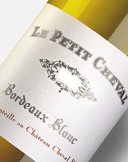Laurent Ponsot 1er Cru Cuvée du Myosotis
Meursault-Blagny Cuvée du Myosotis 1er Cru Sourced from the commune of Blagny, legally classified within the confines of Meursault, this is a thrilling wine of strident length, latent power and an alloyed, ball bearing-like precision. It rolls through the mouth, staining the cheeks with riffs on apricot pith, candied lemon rind, dried mango and a toasted melody of assorted nuts. There is plenty of oak sitting on this, boding well for its procession into a long future in the cellar. A Meursault for the ages, in the hands of a master.
Laurent Ponsot 1er Cru Cuvée de la Centaurée
LAURENT PONSOT 1er Cru Cuvée de la Centaurée , Meursault-Charmes
Petit Cheval Blanc
La Vigne aux Gamins
Chateau Cos d'Estournel Bordeaux Blanc AC
A fresh lively Bordeaux blanc produced from Sauvignon and Semillon, the first vintage of Chateau Cos dEstournel Blanc was made 2005. The grapes are grown north of St. Estèphe, in the Jau-Dignac and Loirac regions. The terroir is a mix of sand, clay, small stones and limestone. The wine is fermented and aged in mostly one-year-old barrels to maintain maximum freshness. Made in small volumes.
Benjamin Leroux Meursault 1er Cru Les Genevrieres
Laurent Ponsot 1er Cru Cuvée de l'Ipomée
Meursault Genevrières Cuvée de l'Ipomée Meursault Genevrières Cuvée de l'Ipomée is a pale lemon and lime in colour, unveiling a fresh lightness on the nose with a touch of zesty citrus and pear aromatics. The palate displays white ripe fruit with a clean acidity cutting a line neatly throughout. This is a pure wine with an attractive length.
Laurent Ponsot Corton Charlemagne Cuvée du Kalimeris Grand Cru
Laurent Ponsots new company is a stage in a wide-ranging project that began four decades ago. In this different format, Laurent Ponsot continues to use his experience, his craftsmanship and his passion to serve the terroir of Burgundy. The company Laurent Ponsot is neither a domain nor a maison: its a state of mind. To create an exceptional wine is the equivalent of designing luxury goods. Haute couture is how we have decided to describe these incredible wines, like unique designer pieces, made even more glorious through our experience and craftsmanship. In 775 Emperor Charlemagne donated this vineyard to a Catholic institution in Saulieu, which kept it for the next 1000 years! Laurent Ponsot SAS sources its grapes from these three villages via six different producers, making a wine representative of the appellation whose richness is derived from its diversity. The wines are finely chiselled, precise, and rich with the scent of flowers and minerals. Match with fish, shellfish or a cheese platter to perfectly showcase their qualities.
Levantine Hill Optume Chardonnay
Clos Saouma Arioso Blanc
Clos Saouma Arioso Blanc, Châteauneuf-du-Pape This is sourced entirely from the Lieu-dit of Pierredon and 100% Grenache Blanc. Its vinified the same way as the Magis see above however the élevage is just one single 500 litre demi-mud for 36 months on full lees, no racking/sulphur for the full period.




















